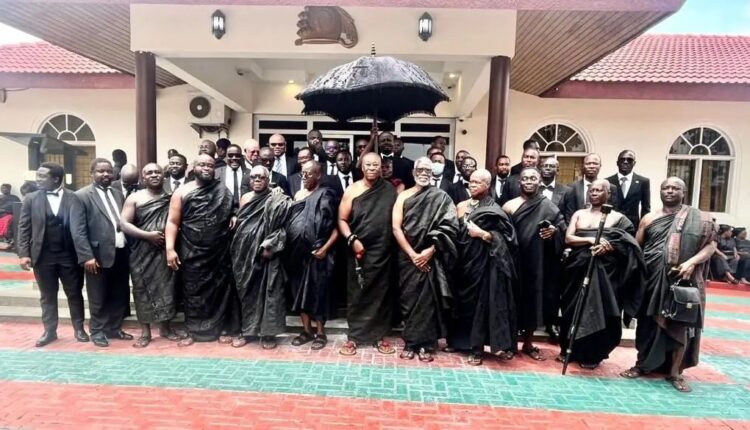Members of Grand Lodge of Ghana and District Grand Lodge of England condole with Asantehene.
The Grand Lodge of Ghana, joined by the District Grand Lodge of England and its Eminence, was among the thousands of mourners who thronged the Manhyia Palace to observe the Doteyie rites for the late Asantehemaa, Nana Konadu Yiadom III.
Her passing has eclipsed the revered Asante Kingdom in mourning, a community noted for its resilience now draped in grief and solemnity.
The Masonic delegation was led by the Most Worshipful Dr. Nortey Kwashie Omaboe, Grand Master, and Very Worshipful Owulaku Hood, District Grand Master, and accompanied by a retinue of senior brethren.
Their presence did two things: to offer respect to the departed Queen Mother and to console the Asantehene, Otumfuo Osei Tutu II — who is the Grand Patron of the Grand Lodge of Ghana and, more personally, the bereaved brother of the late Queen Mother.
In Freemasonry, such a moment transcends ritual formality. The visit finds expression in the order’s binding creed of brotherly love, relief, and truth. By standing in grief with their Grand Patron, the Masons lived the fraternity’s long-cherished tradition, that no brother, however exalted, should walk alone in grief. Their attendance was both symbolic and spiritual, a reminder of the eternal nature of the soul and the unbroken bonds of fellowship that endure beyond the grave.
Dressed in austere black cloth and – the other senior brethren – in the iconic, understated black suits that have become synonymous with Masonic presence at solemn occasions, the Most Worshipful Dr. Omaboe offered words of solace that reached beyond the ceremonial. Quoting Henry Scott-Holland’s enduring reflection Death is Nothing at All, he gently reminded the Otumfuo that love and memory outlast mortality:
“Death is nothing at all. I have only slipped away to the next room. I am I and you are you. Whatever we were to each other, that we are still,” he shared.
The act was more than consolation; it was the Masonic ideal in practice — words offered not just to soothe, but to bind the wounds of sorrow with timeless fraternity.
After signing the book of condolence, the brethren demonstrated relief in tangible form, presenting a donation of GHS 105,000 on behalf of the Freemasons of Ghana — a gesture that underscored the fraternity’s long-standing contributions to Ghanaian society, from health initiatives to educational projects, and its quiet but steady hand in moments of collective need.
Yet, even against the sombre tones of mourning, the Doteyie was also a spectacle — a pageant of culture and continuity. The rites, steeped in Asante custom, offer a rare glimpse into the grandeur of Ghana’s most enduring royal traditions. The entrance of the Asantehene himself was a moment of profound theatre: clad in black cloth, with a traditional black leather cap reserved for solemn occasions and surrounded by a retinue that seemed to embody the very essence of power and legitimacy, he reaffirmed the authority and majesty of the Golden Stool.
For many, it is a poignant reminder of the Asante Kingdom’s indelible role in Ghana’s pre-independence story. Long before modern statehood, the Asante forged a sophisticated political and economic system that resisted colonial pressures and shaped the cultural backbone of the nation. In moments like these — where grief intersects with heritage — the Asante Kingdom does not merely bury its Queen Mother; it reasserts its place as a custodian of Ghana’s history and identity.
The funeral of Nana Konadu Yiadom III, therefore, is not only a farewell to a matriarch but also a convergence of tradition, fraternity, and nationhood. For the Freemasons, it was an occasion to remind their Grand Patron that in grief, as in life, he is never alone.
Source: 3news.com


Comments are closed.